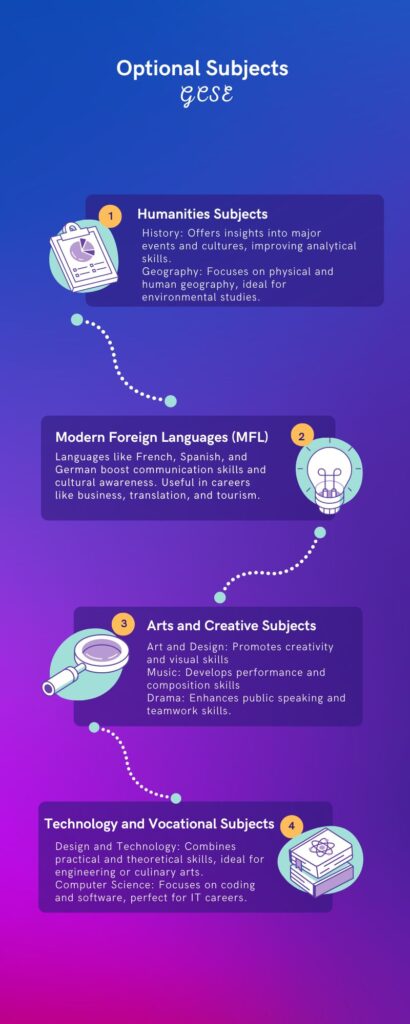In the UK, every student must study three core GCSE subjects: English, Mathematics, and Science. These compulsory subjects ensure that all students acquire essential skills necessary for their future educational and career opportunities.
The curriculum mandates these subjects to equip students with fundamental literacy, numeracy, and scientific knowledge that form the basis for further education and personal development.

1. English Language and Literature
Every student studies English, which includes two separate GCSEs: English Language and English Literature. These subjects develop crucial skills like reading, writing, and comprehension. Students build the ability to communicate effectively, express their thoughts, and engage with various texts, both classical and modern. Employers value proficiency in English because it enhances employability and boosts the ability to communicate clearly and professionally.
2. Mathematics
Mathematics is another compulsory subject and is essential for developing problem-solving and logical reasoning skills. While some students may question the relevance of topics like algebra or trigonometry, the subject as a whole provides a solid foundation for many aspects of everyday life and various professions. From budgeting and financial planning to technical fields such as engineering and science, a good grasp of mathematics is crucial.
3. Science
Science is typically studied as Combined Science, which results in two GCSEs, or as Triple Science, which includes separate GCSEs in Biology, Chemistry, and Physics. Consequently, students can choose the best option based on their interest and academic strengths.
Furthermore, science education helps students understand the world around them from the basics of the human body to the principles of physics that govern natural phenomena.
Moreover, science fosters analytical thinking and enhances students’ ability to approach complex issues with evidence-based solutions. Thus, by studying science, students not only gain knowledge but also develop critical thinking skills that are valuable in both academic and real-world settings.
Additional Compulsory Subjects in Specific Regions
- In Wales, the Welsh language is also a compulsory subject alongside English, Maths, and Science.
- In Northern Ireland, schools may require additional subjects like Learning for Life and Work or Religious Studies depending on their curriculum focus.
Here is national curriculum from gov.uk
Optional Compulsory Subjects Set by Schools
While the government mandates English, Maths, and Science, individual schools may make additional subjects compulsory. Common examples include:
- Modern Foreign Languages (e.g., French, Spanish)
- Geography or History
- Religious Studies
Additionally, These additional subjects are often required to encourage a well-rounded education that covers a range of disciplines and cultural perspectives. Hence, Schools typically offer flexibility for students to choose additional subjects based on their interests and career aspirations.
Why Are These Subjects Compulsory?
Firstly, the rationale behind making these subjects compulsory is to ensure that all students leave secondary school with a solid foundation in literacy, numeracy, and scientific understanding. These subjects provide crucial skills needed for daily life, further education, and employment opportunities, even though some may be among the hardest GCSE subjects, and help prepare students for adult life and participation in society.
GCSEs are taken in key stage 3 and 4
| Child’s age | Year | Key stage |
|---|---|---|
| 12 to 13 | Year 8 | KS3 |
| 13 to 14 | Year 9 | KS3 |
| 14 to 15 | Year 10 | KS4 |
| 15 to 16 | Year 11 | KS4 |

Which Other Options Do You Have?
In addition to the core compulsory subjects of English, Maths, and Science, students have a wide range of optional subjects they can choose to study at GCSE level. Furthermore, The flexibility to select these optional subjects allows students to personalise their education, explore their interests, and build a foundation for future studies or career paths. Here’s an overview of the most common options and how they can be beneficial:
1. Humanities Subjects
- History: It offers insight into significant historical events, global cultures, and the development of societies. Moreover, it helps students build analytical skills and learn to interpret various sources of information effectively.
- Geography: Focuses on the physical and human aspects of the world, such as climate change, natural landscapes, and population dynamics. It’s ideal for students interested in environmental studies and global issues.
These subjects are often recommended for students interested in careers in law, politics, or journalism.
2. Modern Foreign Languages (MFL)
- French, Spanish, German, and other languages are popular options. Learning a new language can enhance communication skills and increase cultural awareness. Additionally, proficiency in another language is highly valued in careers like international business, translation, and tourism.
3. Arts and Creative Subjects
- Art and Design: Encourages creativity and visual expression. This subject is often chosen by students interested in pursuing a career in the creative industries, such as graphic design, fine art, or fashion design.
- Music: Develops skills in performance, composition, and music theory. Furthermore, It’s a great choice for students looking to work in the music industry or related fields like media and entertainment.
- Drama: It involves acting, directing, and stagecraft, while also helping develop public speaking skills, boosting self-confidence, and enhancing teamwork abilities.
4. Technology and Vocational Subjects
- Design and Technology: It covers areas like product design, engineering, and food technology. Moreover, it combines practical and theoretical knowledge, making it ideal for students interested in fields like engineering, architecture, or culinary arts. Additionally, this blend of skills equips students for real-world problem-solving and creative thinking.
- Computer Science: It focuses on coding, software development, and computational thinking. Moreover, with the growing demand for technology professionals, it’s an ideal choice for students entering fields like programming or IT.
5. Business and Social Sciences
- Business Studies: It introduces concepts like entrepreneurship, finance, and marketing. Moreover, it’s beneficial for students considering careers in business management, economics, or finance.
- Psychology and Sociology: Explore human behaviour and societal issues, thus providing a solid foundation for careers in healthcare, counselling, or even social work.
Choosing Optional Subjects
When selecting optional GCSE subjects, students should consider the following factors:
- Interests and Strengths: Choose subjects you enjoy and excel in.
- Future Education and Career Aspirations: Consider subjects that align with A-levels, university courses, or vocational training you may pursue.
- School Offerings: Check with your school to see what subjects are available, as not all schools offer the full range of GCSE options.
By carefully choosing their optional subjects, students can create a balanced and engaging GCSE programme that supports their long-term educational and career goals.

FAQs about GCSEs
How many GCSEs do most students take?
Most students take 9 or 10 GCSEs depending on school curriculum.
Are there any way to avoid compulsory subjects in GCSE?
We always are looking at easy ways to work with and this question are frequently asked. Unfortunately you can not avoid compulsory subjects because it is against the law.
Which is the hardest GCSE subject?
According to feedbacks from students this is the hardest GCSE subjects:
- – Maths.
- – Art & Design (3D Design)
- – English Language.
- – Citizenship Studies.
- – Geography.
- – Design and Technology.
- – History.
- – Psychology.
What are easy subjects for GCSE?
According to feedbacks from students this is the easiest GCSE subjects:
- – Photography
- – Media studies
- – Drama
- – Social sciences
Related blog about GCSEs which will help you find out more:
What are GCSEs?
Free GCSE all level study notes
For best tutors across the UK check out following link:
Find expert tutors with Edumentors which will guide you to all subjects of GCSE








